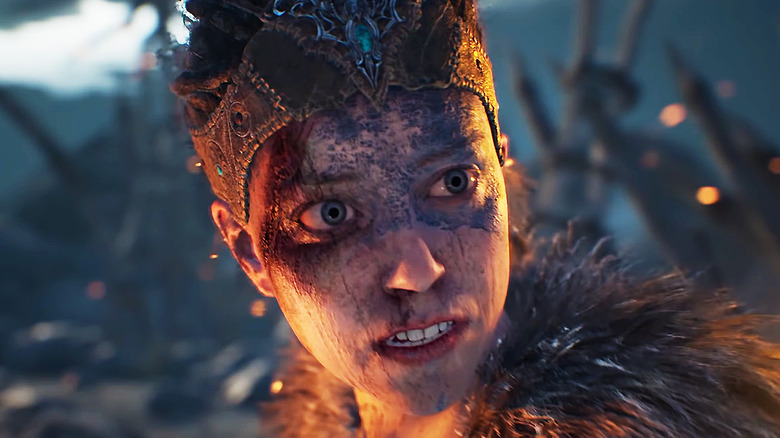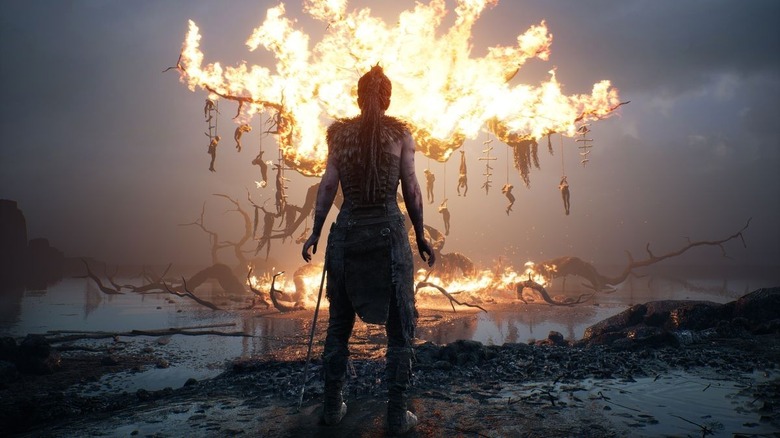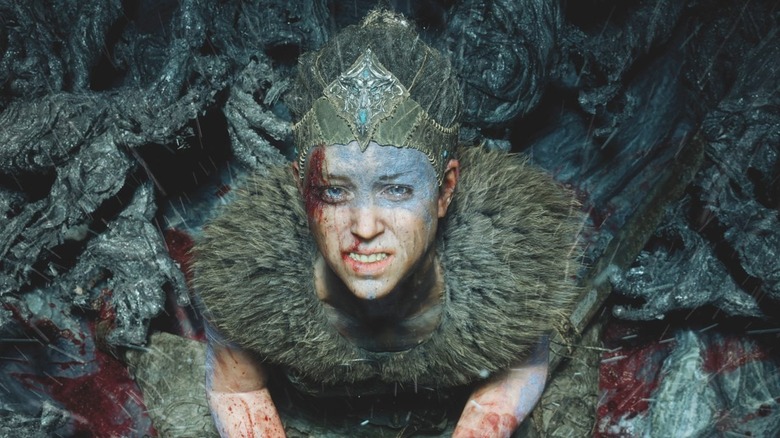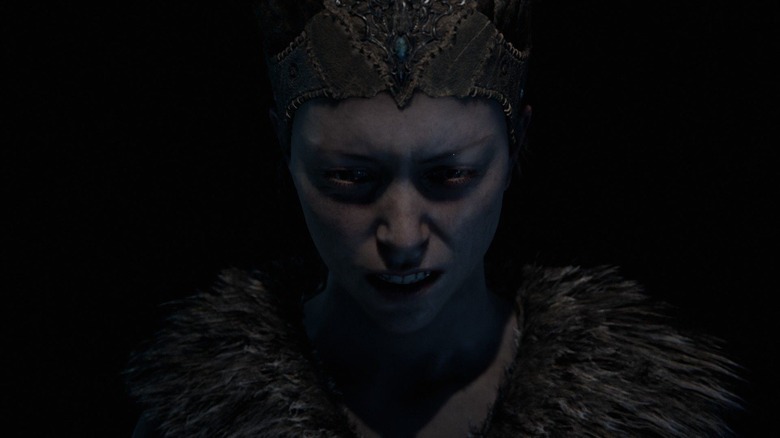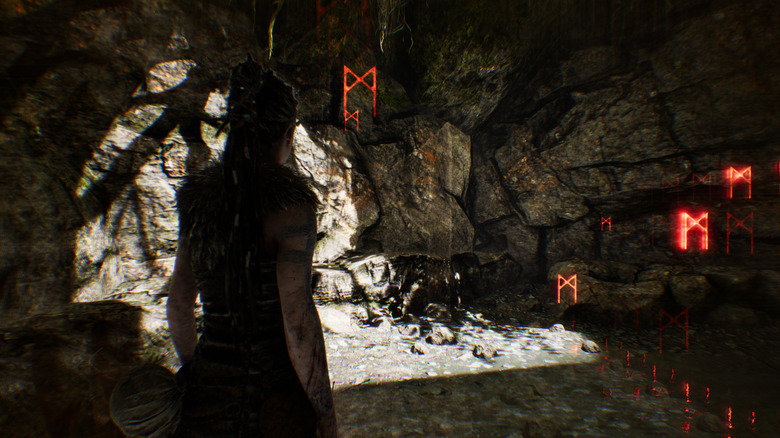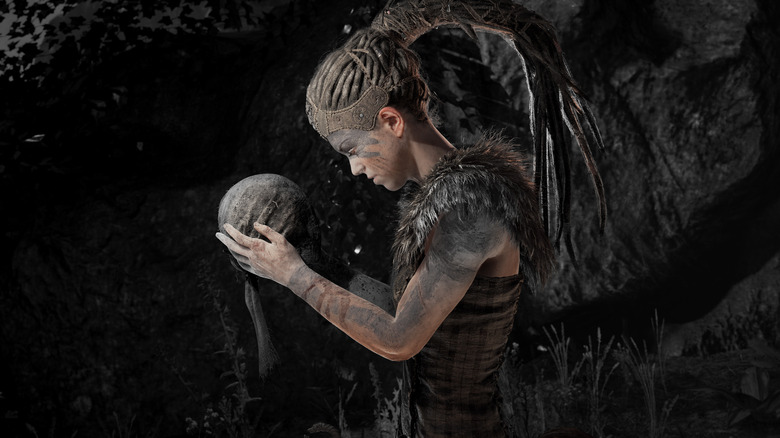Hellblade: Senua's Mental Illness Explained
When "Hellblade: Senua's Sacrifice" released in 2017, it took the video game industry by storm. Marketing "Hellblade" as an "independent AAA" title, developer Ninja Theory gambled on a more niche and hard-hitting story coupled with high production values (via Red Bull). Though only 20 developers worked on the project, the team struck its target, delivering a blockbuster action-adventure at a much lower cost than similar entries.
This creative approach, coupled with the narrative of "Senua's Sacrifice," established Ninja Theory as a studio to watch. Players take on the titular role of Senua, a Celtic warrior who experiences anxiety, depression, and a mental condition known as psychosis. The developers worked closely with individuals who have experienced psychosis and neuroscience experts like the University of Cambridge's Professor Paul Fletcher to bring this aspect to life.
"Psychosis ... refers to having a loss of contact with objective reality," explains Fletcher in a "Hellblade" mental health feature. "It's characterized by two main sets of symptoms: One of them is hallucinations where somebody experiences perceptions when there is no actual objective thing out there to perceive. And the other is delusions where somebody comes to very often bizarre, unpleasant, frightening beliefs when there's no good evidence in favor of them."
With few exceptions, reviewers and gamers praised the developer's representation of psychosis. Lauded as one of the few video games that changed the lives of players, "Hellblade" approaches its subject matter with great care. A look at the production process sheds greater light on Senua's mental illness.
The origin of Senua's psychosis
Prior to the events of "Hellblade," Senua's mother experienced visual and aural hallucinations in the form of visions and voices. Writer and director Tameem Antoniades suggests Senua may have inherited a predisposition for mental health issues from her. When her psychosis emerged between her teens and twenties, mistreatment by her father and the community exacerbated the symptoms. This stigma eventually led to her exile.
Ninja Theory drew inspiration from historical events to create the world of "Hellblade." Senua hails from the Picts, an ancient group who settled in the Orkney Islands off the coast of Scotland. Following the arrival of Vikings in the 8th century, the Pictish population plummeted. While the truth of what happened to them has been lost to time, the developers imagined that the Vikings killed the Picts, sacrificing many of them to their deities.
When Senua ends her exile and returns home, she discovers the slaughter of her people at the hands of the Vikings. She uncovers the body of her lover, Dillion, amidst the carnage, executed via a brutal method known as the "blood eagle." The shock and pain of this moment shatters her reality. She constructs a new reality in its place, setting off for the Norse underworld to reclaim Dillion's soul.
"So the stage was set for a new adventure," explains Antoniades. "A vision quest fuelled by madness and myth. A fantasy that was created by Senua's own mind."
Voice-hearing
As a result of her psychosis, Senua hears voices throughout her journey. "These voices can be in many different forms," elucidates Professor Fletcher. "They can be talking to the person. They can be talking about the person. They can be very critical ... Sometimes they might be kind, they might offer advice."
Ninja Theory turned to a number of groups and people to better understand and capture the experiences of real voice-hearers. According to Durham University psychology professor Charles Fernyhough, hearing voices has ties to several diagnoses, with schizophrenia prominent among them. He also points out that many individuals who fall outside the realm of mental illness experience such auditory verbal hallucinations on a regular basis. Despite their prevalence, voice-hearing remains heavily stigmatized.
Though the voices in "Hellblade" are manifestations of Senua's thoughts, she does not perceive them that way. To her, they are fully-realized individuals. Some mimic figures from her past, while others, such as the double-edged Furies, seem to personify concepts like malice or fear. These voices differ in quantity and location in space, which the developers conveyed through binaural audio. "We recorded the actors using a binaural microphone, which records the 3D spatial position of sound, replicating the way sound is heard by human ears," clarifies Antoniades.
Thanks to the research and strategies used by the team, the soundscape serves as one of the most immersive aspects of "Hellblade," transporting players into Senua's world. "It's not about what you hear," summarizes audio lead David Garcia, "but what Senua hears."
Visions and flashbacks
Visions and flashbacks often play a key role in psychosis. Ninja Theory worked with Recovery College East, a group that assists people recovering from severe mental disorders, to better understand and incorporate this aspect into "Hellblade." The team gathered direct accounts from several individuals who used Recovery College East's services.
"The reality of what people experience was vivid, far exceeding what I could possibly have imagined," divulges Antoniades. "We went away itching to represent some of these visions and flashbacks in the game."
The studio included a compilation of statements they received along with their corresponding gameplay during a mental health feature about "Senua's Sacrifice." "Everything is in bits," describes one individual. "Like a photograph that's torn and put together again." "At times there is nothing to hold onto and I go into a trance," reads another account. "The mind goes blank and everything gets switched off."
The participants described experiences ranging from captivating to horrifying. Players can glimpse the former in "Hellblade" through instances of fractured or saturated light that take on a kaleidoscope-like effect. But these visions are often more terrible than beautiful, as demonstrated by malevolent forces banging on doors and corpses hanging from ceilings. "It can be a living horror for some," says Antoniades. "I was urged by one fellow that we should not shy away from showing this horror ... Had we gone too far with our representations or not far enough?"
Patterns and delusions
"In some ways, voice-hearing and visions were the low-hanging fruit so to speak," explains Antoniades. "There's another aspect of psychosis that is much harder to explain, but one that I think video games are uniquely able to represent, which are often called delusions."
Those who experience psychosis may perceive their surroundings in a different way, detecting patterns and forming links between objects or concepts that would not occur to others. Aspects most consider mundane, such as certain words or colors, gain great importance, even manifesting as some sort of puzzle that needs to be solved. Often, the individuals aren't aware that these delusions veer away from the norm.
"There are many things that happen in the world of 'Hellblade' that make perfect sense within the context of Senua's mind," highlights Antoniades. This list includes the deadly rot threatening her life, the runes preventing her from reaching Helheim, and befuddling associations between objects and symbols. "To complete Senua's quest, you have to internalize and accept the logic and meaning behind these things to progress."
'Senua is a person not a mental illness'
During a keynote address in 2019, Professor Fletcher detailed the process used to create "Hellblade." The idea that "Senua is a person not a mental illness" became fundamental for the team, which sought to move beyond the harmful generalizations and assumptions often associated with psychosis. The accounts of individuals living with severe mental illness helped Ninja Theory avoid these pitfalls and present a deeper, more nuanced protagonist.
"People with lived experience were keen to emphasize another point: that it is wrong to define a person by their symptoms," drives home Antoniades. "Quite often the illness comes not from the symptoms, but from the stigma, isolation, and mistreatment that comes about from the rest of society."
One area where players can see the consequences of this adversity is the combat system. "The violence experienced is not the result of Senua's mental illness," asserts studio head Dominic Matthews. "The trauma and violence of Senua's past has resulted in her condition, not the other way around." Between the mistreatment by her own people and the devastating results of the Viking invasion, Senua's mental state is influenced by very real threats.
Despite her suffering, Ninja Theory wanted to make it clear that "Senua is a hero not a victim." Even in the face of The Darkness and an onslaught of hellish enemies, she pushes through her fear to continue her quest.
If you or someone you know needs help with mental health, please contact the Crisis Text Line by texting HOME to 741741, call the National Alliance on Mental Illness helpline at 1-800-950-NAMI (6264), or visit the National Institute of Mental Health website.

